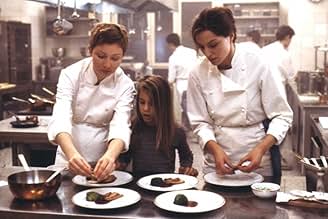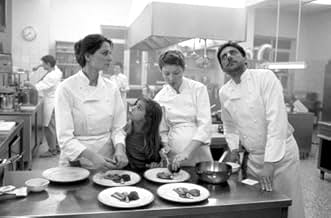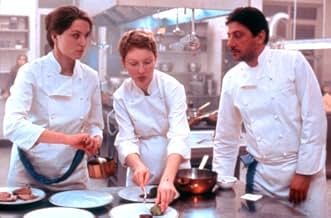AVALIAÇÃO DA IMDb
7,2/10
8,7 mil
SUA AVALIAÇÃO
Adicionar um enredo no seu idiomaWhen a headstrong chef takes charge of her equally stubborn 8-year-old niece, the tensions between them mount... until an Italian sous-chef arrives to lighten the mood.When a headstrong chef takes charge of her equally stubborn 8-year-old niece, the tensions between them mount... until an Italian sous-chef arrives to lighten the mood.When a headstrong chef takes charge of her equally stubborn 8-year-old niece, the tensions between them mount... until an Italian sous-chef arrives to lighten the mood.
- Prêmios
- 14 vitórias e 7 indicações no total
Wolf-Dietrich Sprenger
- Lauter Gast
- (as W.D. Sprenger)
Victoria Trauttmansdorff
- Begleiterin
- (as Victoria von Trautmannsdorf)
Jerome Ducornau
- Jean
- (as Jerome Ducournau)
Enredo
Você sabia?
- CuriosidadesSergio Castellitto's German wasn't good enough so Frank Glaubrecht was brought in to dub his voice for the German version.
- Erros de gravaçãoWhen Mario and Lina get ready to cook dinner at Martha's apartment, Lina puts on her apron twice.
- ConexõesFeatured in Le cinéma passe à table (2005)
- Trilhas sonorasCountry
Written by Keith Jarrett
Performed by Keith Jarrett, Jan Garbarek, Palle Danielsson, Jørn Christensen
ECM Records
Avaliação em destaque
A few rhetorical questions:
a. Why are there no great English-language food/romance movies? Whenever you see a movie that truly ravishes you with food preparation and recipes as part of the atmosphere of the movie, it comes from France or Mexico or Hong Kong - or, if it is in English, it's borrowed culturally from another country (e.g. Chocolat, or the Mexican-American adaptation of Ang Lee's Eat Drink Man Woman). I think it's because the English speaking societies of the world have a relatively unsophisticated approach to food preparation and dining, manifest in our great contributions to world culinary arts - fast food and industrial agriculture, plus cooking technologies that take art out of the equation. You can't have a sexy drama set amidst a world of force-fed veal or microwave dinners.
b. Why do we never talk about German comedy? The Germans do have a comedic tradition, but the movies that are released in the US tend to be solemn dramas, violent or shocking action pieces or grim experimental works. On the rare instances that I see a German comedy, I'm always pleasantly surprised, and I have the feeling I'm missing out.
c. Why are European movies so much better than American films at showing sexiness and desirability in 30- or 40-something year-old women? I have a pet theory, that European sensibilities about marriage and commitment are sufficiently different from American norms that there is the expectation that a 35-year old woman may yet be actively and happily single, or perhaps a single mom who isn't stigmatized to feel that she had best find some sucker to marry her and get out of the dating pool.
d. Why isn't jazz used in American soundtracks anymore? In this film set in Germany, the score is assembled by Manfred Eicher (founder of ECM, the acclaimed modern-jazz label), and it's all good. Some nice German lieder, classic vocal jazz, and instrumental pieces by Keith Jarrett and others. We Americans appear to have forgotten jazz as soundtrack music.
In any case, Mostly Martha is a fine little movie set in contemporary Köln, starring Martina Gedeck as the title character. Martha is a neurotic, workaholic chef at a high-end restaurant, whose control freak tendencies keep her at a distance from everyone. When her boss insists that she go to therapy, she replies by preparing recipes for the hapless shrink. Both lonely and a loner (a tricky combination), she throws herself into her work to the point of exhaustion.
Martha's single-minded life is thrown upside down when she suddenly becomes the guardian to her niece Lina (Maxime Foerste). As she struggles to take on this new role, the arrival of a competitor in the form of a brash Italian chef (Sergio Castellitto) threatens her supremacy in the kitchen.
Any viewer of romantic comedies knows where this is going, but I have no complaints about the plot line. The performances were all good; the dialogue is thoughtful; the food looks delicious. It's not a great movie, but it's a good one and would be an admirable effort by any studio.
a. Why are there no great English-language food/romance movies? Whenever you see a movie that truly ravishes you with food preparation and recipes as part of the atmosphere of the movie, it comes from France or Mexico or Hong Kong - or, if it is in English, it's borrowed culturally from another country (e.g. Chocolat, or the Mexican-American adaptation of Ang Lee's Eat Drink Man Woman). I think it's because the English speaking societies of the world have a relatively unsophisticated approach to food preparation and dining, manifest in our great contributions to world culinary arts - fast food and industrial agriculture, plus cooking technologies that take art out of the equation. You can't have a sexy drama set amidst a world of force-fed veal or microwave dinners.
b. Why do we never talk about German comedy? The Germans do have a comedic tradition, but the movies that are released in the US tend to be solemn dramas, violent or shocking action pieces or grim experimental works. On the rare instances that I see a German comedy, I'm always pleasantly surprised, and I have the feeling I'm missing out.
c. Why are European movies so much better than American films at showing sexiness and desirability in 30- or 40-something year-old women? I have a pet theory, that European sensibilities about marriage and commitment are sufficiently different from American norms that there is the expectation that a 35-year old woman may yet be actively and happily single, or perhaps a single mom who isn't stigmatized to feel that she had best find some sucker to marry her and get out of the dating pool.
d. Why isn't jazz used in American soundtracks anymore? In this film set in Germany, the score is assembled by Manfred Eicher (founder of ECM, the acclaimed modern-jazz label), and it's all good. Some nice German lieder, classic vocal jazz, and instrumental pieces by Keith Jarrett and others. We Americans appear to have forgotten jazz as soundtrack music.
In any case, Mostly Martha is a fine little movie set in contemporary Köln, starring Martina Gedeck as the title character. Martha is a neurotic, workaholic chef at a high-end restaurant, whose control freak tendencies keep her at a distance from everyone. When her boss insists that she go to therapy, she replies by preparing recipes for the hapless shrink. Both lonely and a loner (a tricky combination), she throws herself into her work to the point of exhaustion.
Martha's single-minded life is thrown upside down when she suddenly becomes the guardian to her niece Lina (Maxime Foerste). As she struggles to take on this new role, the arrival of a competitor in the form of a brash Italian chef (Sergio Castellitto) threatens her supremacy in the kitchen.
Any viewer of romantic comedies knows where this is going, but I have no complaints about the plot line. The performances were all good; the dialogue is thoughtful; the food looks delicious. It's not a great movie, but it's a good one and would be an admirable effort by any studio.
- zwirnm
- 8 de nov. de 2002
- Link permanente
Principais escolhas
Faça login para avaliar e ver a lista de recomendações personalizadas
- How long is Mostly Martha?Fornecido pela Alexa
Detalhes
Bilheteria
- Faturamento bruto nos EUA e Canadá
- US$ 4.160.475
- Fim de semana de estreia nos EUA e Canadá
- US$ 40.446
- 18 de ago. de 2002
- Faturamento bruto mundial
- US$ 9.852.022
- Tempo de duração1 hora 49 minutos
- Cor
- Mixagem de som
- Proporção
- 1.85 : 1
Contribua para esta página
Sugerir uma alteração ou adicionar conteúdo ausente

Principal brecha
By what name was Simplesmente Martha (2001) officially released in Canada in English?
Responda
![Assistir a Trailer [OV]](https://m.media-amazon.com/images/M/MV5BYmI4MTFiNjAtNzg5ZC00Mjg2LWFhNDYtMTVhYjYyMTM3ZGM5XkEyXkFqcGdeQXRyYW5zY29kZS13b3JrZmxvdw@@._V1_QL75_UX500_CR0)



























